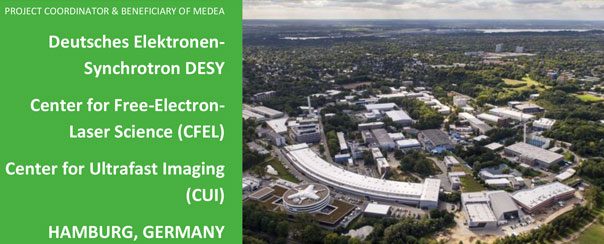Home institution
Center for Free-Electron Laser Science (CFEL)
The Center for Free-Electron Laser Science is a joint enterprise of Deutsches Electronen Synchrotron (DESY), the Max Planck Society (MPG), and the University of Hamburg and is designed to advance science with next generation light sources and lasers.
The three partners join forces to explore structural changes of atoms, molecules, condensed, biological, or warm dense matter on femtosecond time scales. CFEL envisions uncovering the “dynamics of matter” by uniting expertise from various disciplines and research institutions into a new interdisciplinary and synergistic effort.
CFEL was founded in 2007 and resides in the new “tower of light” building on the Science Campus Hamburg-Bahrenfeld/DESY since 2012. Currently CFEL hosts 29 independent research groups with over 400 scientists, engineers and technicians that are working in a broad range of research areas from medicine and biology to physics, including chemistry, materials and nano-sciences. CFEL scientist are involved in the three local graduate schools, the general PIER Helmholtz Graduate School, the International Max Planck Research School for Ultrafast Imaging & Structural Dynamics and the Graduate School of the Hamburg Centre for Ultrafast Imaging (CUI), the Hamburg Cluster of Excellence.
Controlled Molecule Imaging Group (CMI)
The Controlled Molecule Imaging group (CMI) started at CFEL in 2010 and is an independent research group embedded in the Coherent Imaging Division of CFEL. Our research focuses on (predominately) gas phase sample preparation, control and manipulation of these samples at both the quantum and macroscopic level, and the investigation of the electronic and nuclear structure and dynamics of these well-defined chemical samples at the spatial and temporal scales at which they occur. A plethora of novel techniques can be utilized for these investigations, such as electron and x-ray diffraction, as well as ion and photoelectron imaging. The culmination of all the effort puts us in a position to be able to watch and understanding molecules at work.
Deutsches Elektronen-Synchrotron DESY
DESY is one of the world’s leading accelerator centers. Researchers use the large-scale facilities at DESY to explore the microcosm in all its variety – from the interactions of tiny elementary particles and the behavior of new types of nanomaterials to biomolecular processes that are essential to life. The accelerators and detectors that DESY develops and builds are unique research tools. The facilities generate the world’s most intense X-ray light, accelerate particles to record energies and open completely new windows onto the universe. That makes DESY not only a magnet for more than 3000 guest researchers from over 40 countries every year, but also a coveted partner for national and international cooperations. Committed young researchers find an exciting interdisciplinary setting at DESY. The research center offers specialized training for a large number of professions. DESY cooperates with industry and business to promote new technologies that will benefit society and encourage innovations. This also benefits the metropolitan regions of the two DESY locations, Hamburg and Zeuthen near Berlin.
Center for Ultrafast Imaging and Universität Hamburg
Counting more than 40.000 students Universität Hamburg is the largest research and educational institution in Northern Germany and the third largest university in Germany. The diversity of a full-scale university is reflected in approximately 170 courses of studies. More than 4.100 scientists, among them almost 700 professors, are doing research and teach. The research profile of Universität Hamburg is characterized by excellent individual projects and interdisciplinary main research areas. In the fields of physics and chemistry research is focused on the structure and dynamics of matter. Research groups tackle questions on the fields of quantum matter, nanostructures, ultrafast processes as well as physical chemistry and biological physics. Research groups on particle, astro and mathematical physics try to answer fundamental questions about our universe. Within the Excellence Initiative of the German Federal and State governments the main research areas in Earth Science as well as Photon and Nano Science each developed into clusters of excellence: „Integrated Climate System Analysis Prediction“ (CliSAP, 2007) and „The Hamburg Center for Ultrafast Imaging“ (CUI, 2012). The Hamburg Centre for Ultrafast Imaging addresses fundamental questions on chemical and physical processes in photon and nanoscience. The scientists of CUI hope to gain profound insight into fundamental phenomena such as the mechanisms of high temperature superconductivity, the appearance of different states of magnetism or the development of ordered molecular as well as biological and mesoscopic structures. Hamburg with its highly developed and advanced X-ray and electron sources as well as laser physics facilities offers a unique surrounding for the direct imaging of atomic processes. Since 2012, about 50 scientific teams from Universität Hamburg and its partners Deutsches Elektronen Synchrotron, European Molecular Biology Laboratory Hamburg, European XFEL and the Max Planck Institute for the Structure and Dynamics of Matter work together under the umbrella of the CUI cluster of excellence.
Research Training Modules (RTMs)
- Techniques for molecular state-, structure-, and size-selection (see PDF below for details)
- Introduction to experiments at the Free-Electron Laser FLASH (see PDF below for details)
Address
Center for Free-Electron Laser Science (CFEL)
Deutsches Elektronen-Synchrotron DESY
Notkestrasse 85
22607 Hamburg
General Contacts
http://www.controlled-molecule-imaging.org
http://www.cfel.de
http://www.desy.de
Scientist in charge
Jochen Küpper
+49-40-8998-6330
jochen.kuepper@cfel.de
